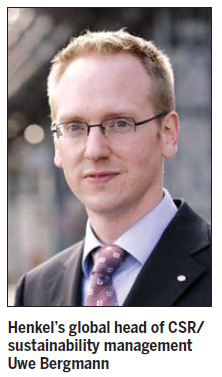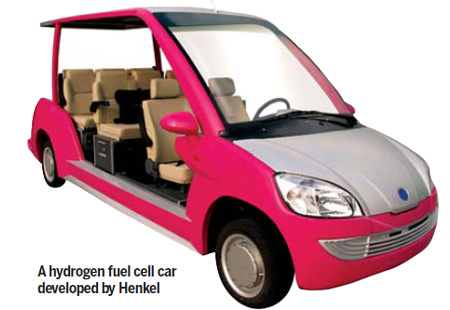Tech
Chemistry Special: German giant Henkel: Strategies for sustainability and innovation
(China Daily)
Updated: 2010-11-01 07:54
 |
Large Medium Small |

Editor's note: Henkel, the German business group behind such leading brands as Schwarzkopf, Loctite, Teroson, Pritt and Pattex, is hoping that its strategies will help in sustainable urban development, the theme of the Shanghai Expo 2010. China Daily reporter Ma Zhenhuan talks with Henkel's global head of CSR/sustainability management Uwe Bergmann on the company's approach.
Q: What's the overall strategy for Henkel's sustainability strategy globally and in China for the next three years?
A: We are committed to leadership in sustainability. The fundamental aspiration is to harmonize economic, ecologic and social goals. We implement this with a long-term, entrepreneurial approach, aiming to set new standards, not just to comply with existing ones.
We provide products, technologies and processes that satisfy the highest expectations. We are committed to the safety and health of our employees, protecting the environment and the quality of life in all regions in which we operate.
This approach brings us a clear competitive advantage and helps us achieve our full business potential - and it will provide us with a significant edge in the future competition for new talent.
Our goal is to drive change toward sustainability, working hand in hand with our industrial customers, our retailers and our consumers worldwide, today and tomorrow.
We systematically focus all our activities throughout the value chain on the challenges of sustainable development as they relate to our operations and group the challenges in five overarching focal areas - energy and climate, water and wastewater, materials and waste, health and safety, and social progress.
The importance of these focal areas will increase even further with continued growth in the world's population and the rise in average standards of living - especially in growth regions like China - and the associated levels of consumption.
In 2007, we defined corporate targets for 2012 - 15 percent reduction in energy consumption, 10 percent reduction in water consumption, 10 percent reduction in the amount of waste generated - all measured per metric ton of output - and 20 percent reduction in occupational accidents.
But sustainability is not limited to our production sites. We clearly state our commitment that all employees receive training and continuing education to ensure that they are appropriately qualified for their tasks.
For us, the decisive factor is how we generate our sales and profits, and that we always act responsibly throughout the value chain, worldwide.
How can Henkel's sustainability strategy help its customers and businesses?
In line with our commitment - all new products contribute to sustainable development in at least one of our focal areas - we concentrate on researching and developing innovative and smart solutions that offer significant added value - they combine top performance with responsibility toward people and the environment.
At the same time, they enable customers and consumers to make more efficient use of valuable resources such as energy and water. We work closely with our customers in order to help them to understand and appreciate the added value of these innovations.
Our adhesives, sealants and surface treatments serve many different markets, such as the automotive, electronics, aerospace, metal and packaging industries and well as in the development of alternative sources of energy and for maintenance, repair and overhaul. They help to make industrially manufactured goods more durable, lighter and more efficient.
Our adhesives know-how also helps to protect buildings against cold and dampness and to repair daily use items while our glues and tapes are much appreciated in the home, in schools and in offices.
Recently we summarized the contributions of our automotive applications on our website henkel-car.com. Through weight-savings achieved with our adhesives, structural foams and sprayable acoustic materials, 2.3 grams of CO2 can be saved per kilometer.
What did Henkel do in the R&D sector to bring more environmentally friendly products to China?
Solutions from Henkel can be found in many objects that touch our lives every day - cars, books and magazines, computers, aircraft, refrigerators, cellphones, furniture, textiles, packaging and many more.
Henkel is the world market leader in adhesives, sealants and surface treatments. It supplies many different manufacturing industries with advanced products and systems solutions.
A fundamental strength is Henkel's geographical presence. Through its seamless global network it can offer the same high standards of research, product development, application testing and sales support anywhere in the world, whether in Germany, in the US or in China.
One of our global R&D centers is located in Shanghai, where we work very closely with the local research institutes and universities to push the boundary of frontier science and technology and bring creative ideas to real life. For instance, Henkel has been deeply involved in the development of the hydrogen fuel cell cars used at the World Expo. This is a car model that has zero carbon emissions and represents the future of our mobility.
Do you sponsor any corporate social responsibility (CSR) or sustainability projects here in China?
We have been actively and continuously involved in local CSR or sustainability projects since the very beginning of our Chinese market development. We donated 500,000 deutschmarks to the Beijing government for the restoration of the Great Wall in 1988, even two years before we established our first joint venture company in China. It's important to note that all the local CSR activities are in line with our global CSR and sustainability strategy.
For us, the decisive factor in sustainability is how we generate our sales and profits, and that we always act responsibly throughout the value chain. Social engagement or corporate citizenship also plays an important role in our corporate culture.
The Henkel smile provides the umbrella for the company's corporate citizenship activities extending beyond direct business interests. We have structured our global activities around three core elements: Make an impact on tomorrow (MIT), emergency aid worldwide and engagement for the common good.
The MIT initiative relies on our employees and retirees, who initiate and implement all of the projects. Henkel supports the volunteer work carried out by its employees and retirees through in-kind, product and financial donations, and specialist advice.
As part of Henkel's global social engagement activities, Henkel China sponsored 134 orphans in Jiangsu province this year to finish their basic education and help to improve their life quality. A group of 40 Henkel volunteers have just returned from the orphans counties, bringing them daily necessities and care which the orphans need most.
What should be the relationship between producing eco-friendly products and business growth?
Sustainability has three dimensions and Henkel has always strived to create a balance between people, planet and profit. We are convinced that our continued focus on sustainability will help to grow the long-term value of our company and to realize our strategic priorities. Let me give you some examples:
For us, the combination of excellent performance with responsibility toward people and the environment is the innovation driver of the future. It results in increasingly efficient products and improved technical solutions. Thereby sustainability becomes an important driver of economic growth and the generation of competitive advantages in the market.
By sharing our decades of experience in sustainability we can offer effective solutions to our customers for improving their own sustainability performance. With our brands and technologies, we can position Henkel as a leading sustainability partner for our industrial customers, for retailers, and for consumers.
And finally corporate social responsibility strengthens the motivation of our employees and their identification with the company - and thereby creates the basis for a strong global team. The skills and performance of our employees are key factors for ensuring the future success of our company.
Henkel has been repeatedly awarded by Walmart and Dow Jones for its sustainability achievements, what do you think that makes your company different from other Fortune 500 companies in terms of sustainability strategy?
Looking back into history, more than 100 years ago, Henkel was already incorporating the concept of sustainability into its way of working. Daring to pioneer, Henkel has built up a DNA over time which is now not only an asset for the company, but also a force driving the agenda for the future.
Working together with our partners up and down the value chain we need to continue to increase the performance of our products while significantly decreasing the associated footprint. In a joint effort we could make truly innovative, sustainable consumption a reality within a reasonable time-frame, generating value for the industry, the consumer and society, and ultimately also for our planet.
